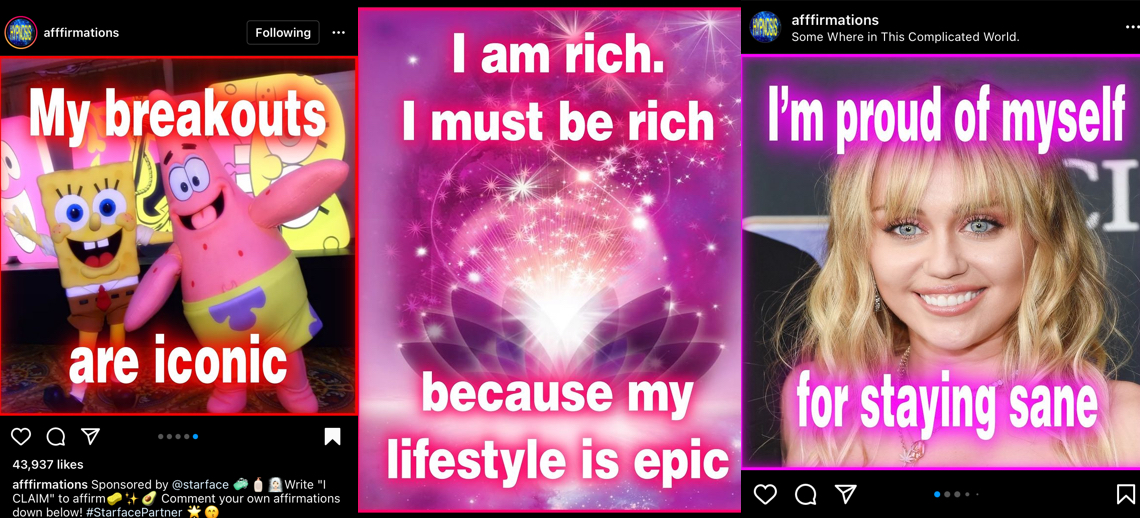“I love the sound of my alarm clock.” “Making money is so easy in 2022.” “Soon I will be able to buy my own home.” “Work gives my life meaning.” These are just a few of Gen Z’s favorite inspirational Instagram memes. As you can tell, they are anything but inspirational.
“Affirmation” accounts, with dark humor and twisted aesthetics (think parodies of pastel-colored motivational quotes), have rapidly gained popularity on social media. As they’ve caught on with Gen-Z users, beauty brands have begun paying attention. Gen-Z acne-care brand Starface, for example, recently did its first-ever sponsored meme post in partnership with @afffirmations, the most popular of this type of account.
“We’ve all been big fans of @afffirmations for a long time. The account always manages to post relatable, laugh-out-loud content,” said Meredith Kassler, director of brand strategy at Starface. Starface became the second-ever brand to sponsor a post on the account by promoting its SpongeBob collaboration with a collection of SpongeBob-themed memes on April 21. The campaign was a success, giving a 3% boost to Starface’s Instagram following. The brand currently has 200,000 followers.
It’s been hard to ignore the aesthetically pleasing inspirational memes that have overtaken Instagram in recent years. Afffirmations is everything they are not.
With soothing fonts and a lot of millennial pink, the more sincere versions of affirmation meme accounts offer self-help platitudes that implore readers to “trust your intuition” or “let go of what’s holding you back.” Frequently shared by millennial influencers, the underlying message of these accounts implies that one can improve their life’s circumstances simply by improving their mindset. (See also: manifesting.)
Afffirmations, meanwhile, appears to be under no such pretension. Described by a Rolling Stone article as a response to Gen Z’s “existential dread,” the account addresses the deepest — and most superficial — anxieties people face from the many crises of this time. “Afffirmations” memes address problems ranging from mental and physical health to economic woes and current events, or touch on general feelings of ennui (“I did not just realize how repetitive life is”) and insecurity. Others are just downright absurd. With statements such as “I can trick my brain into liking Mondays” and “Social media is good for me,” it has gained a cult following by calling on users to respond with “I claim,” in order to conduct what it dubs “global self-hypnosis.”
Ad position: web_incontent_pos1
“Meme accounts are a needed break from the curated, inspirational side of Instagram,” said Kassler. “Social media can be an overwhelming place where you feel like you have to present your best self at all times. It’s easy to find yourself scrolling aimlessly and comparing yourself to other people.”
She said this rejection of perfectionism works for a brand like Starface, which promotes the online acne positivity movement that has been embraced by Gen-Z influencers like Charli D’Amelio.
The visuals of Afffirmations and similar accounts are also in line with Gen Z’s turn away from the standard Instagram aesthetic. With a bold color scheme that’s all over the place, affirmation meme fonts evoke ’90s-era computer word art paired with images ranging from the humorous to the deeply disturbing. Cartoon characters, early aughts pop stars, troll dolls and terrifying clowns are in the mix.
The “immediately recognizable” account “does a great job of referencing nostalgic characters and pop culture while still being relevant to what’s going on today,” said Kassler.
Ad position: web_incontent_pos2
Reportedly created by a 20-year-old Norwegian college student named Matthew (who did not respond to a request for an interview), Afffirmations is catching on beyond Gen-Z social media stars. Celebrity followers of the account include Barbie Ferreira, Ella Emhoff and Dixie D’Amelio, as well as millennials like Tessa Thompson.
Both sincere and parody accounts address similar anxieties of the current era. With many in the Instagram generation feeling overworked and burnt out — yet unable to reach life milestones like buying a home — while also reading terrible news daily, and grappling with mental illness that’s unaffordable to treat, they have turned to inspirational memes. As Instagram has become far less escapist throughout the pandemic, there’s something strangely comforting in Afffirmations. Addressing issues head-on, it shows the absurdity of essentially telling people that life problems caused by structural issues in society are just a product of their negative mindset.
At 973,000 followers, its style is clearly resonating. With a cult following, it sells a range of merch printed with its most popular memes and recently held an in-person exhibition in Barcelona. The account has also spawned a huge range of spinoffs dedicated to niche topics, with “affirmations” accounts popping up worldwide for specific colleges and cities.
While Afffirmations-style memes have not received much attention yet in terms of sponcon, brands have already begun dabbling in more humorous styles of memes. Truly Beauty, which also recently did a SpongeBob collaboration, peppers its feed with SpongeBob and other cartoon meme jokes. In the men’s personal care category, Dr. Squatch has been especially devoted to comical content and memes.
“Funny, relatable and relevant content wins,” said Kassler, who added that partnering with these types of meme accounts is “definitely a strategy we’d like to continue to iterate on in the future.”




